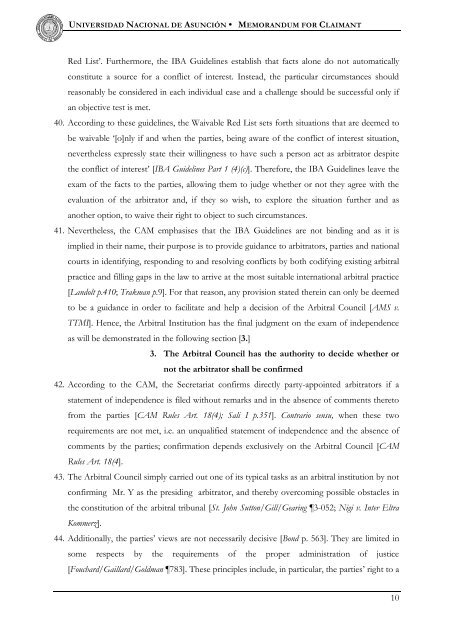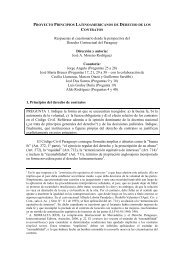MEMORANDUM FOR CLAIMANT
MEMORANDUM FOR CLAIMANT
MEMORANDUM FOR CLAIMANT
You also want an ePaper? Increase the reach of your titles
YUMPU automatically turns print PDFs into web optimized ePapers that Google loves.
UNIVERSIDAD NACIONAL DE ASUNCIÓN • <strong>MEMORANDUM</strong> <strong>FOR</strong> <strong>CLAIMANT</strong><br />
Red List‘. Furthermore, the IBA Guidelines establish that facts alone do not automatically<br />
constitute a source for a conflict of interest. Instead, the particular circumstances should<br />
reasonably be considered in each individual case and a challenge should be successful only if<br />
an objective test is met.<br />
40. According to these guidelines, the Waivable Red List sets forth situations that are deemed to<br />
be waivable ‗[o]nly if and when the parties, being aware of the conflict of interest situation,<br />
nevertheless expressly state their willingness to have such a person act as arbitrator despite<br />
the conflict of interest‘ [IBA Guidelines Part 1 (4)(c)]. Therefore, the IBA Guidelines leave the<br />
exam of the facts to the parties, allowing them to judge whether or not they agree with the<br />
evaluation of the arbitrator and, if they so wish, to explore the situation further and as<br />
another option, to waive their right to object to such circumstances.<br />
41. Nevertheless, the CAM emphasises that the IBA Guidelines are not binding and as it is<br />
implied in their name, their purpose is to provide guidance to arbitrators, parties and national<br />
courts in identifying, responding to and resolving conflicts by both codifying existing arbitral<br />
practice and filling gaps in the law to arrive at the most suitable international arbitral practice<br />
[Landolt p.410; Trakman p.9]. For that reason, any provision stated therein can only be deemed<br />
to be a guidance in order to facilitate and help a decision of the Arbitral Council [AMS v.<br />
TTMI]. Hence, the Arbitral Institution has the final judgment on the exam of independence<br />
as will be demonstrated in the following section [3.]<br />
3. The Arbitral Council has the authority to decide whether or<br />
not the arbitrator shall be confirmed<br />
42. According to the CAM, the Secretariat confirms directly party-appointed arbitrators if a<br />
statement of independence is filed without remarks and in the absence of comments thereto<br />
from the parties [CAM Rules Art. 18(4); Sali I p.351]. Contrario sensu, when these two<br />
requirements are not met, i.e. an unqualified statement of independence and the absence of<br />
comments by the parties; confirmation depends exclusively on the Arbitral Council [CAM<br />
Rules Art. 18(4].<br />
43. The Arbitral Council simply carried out one of its typical tasks as an arbitral institution by not<br />
confirming Mr. Y as the presiding arbitrator, and thereby overcoming possible obstacles in<br />
the constitution of the arbitral tribunal [St. John Sutton/Gill/Gearing ¶3-052; Nigi v. Inter Eltra<br />
Kommerz].<br />
44. Additionally, the parties‘ views are not necessarily decisive [Bond p. 563]. They are limited in<br />
some respects by the requirements of the proper administration of justice<br />
[Fouchard/Gaillard/Goldman ¶783]. These principles include, in particular, the parties‘ right to a<br />
10



